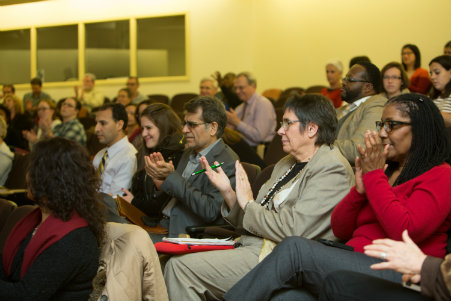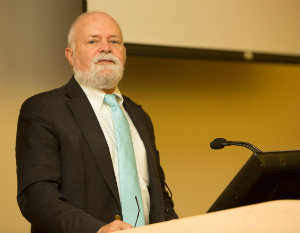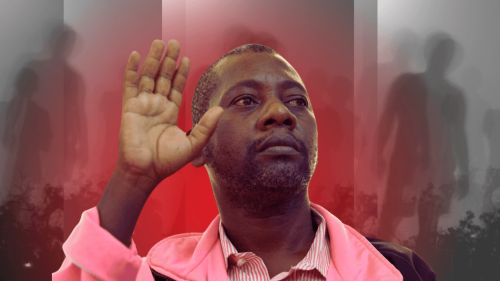'Religious illiteracy' at root of distrust and bigotry

American society and institutions are more racially and culturally diverse than ever, yet a spirit of understanding and acceptance of differences remains elusive. That paradox is abundantly evident today in America’s relationship with Islam.
Dr. Ali Asani, Harvard University professor of Indo-Muslim and Islamic religion and cultures, said the conflict between many Americans and many Muslims is one of “religious illiteracy” that feeds fear, bigotry and, too often, hatred.
“We are living in a world with intensive polarization,” Asani said, speaking to a large audience in Lesley’s University Hall Amphitheater on Nov. 4. Asani’s appearance was co-sponsored by the Lesley University Diversity Council, Graduate School of Education and Graduate School of Arts and Social Sciences. It was part of the university’s yearlong academic and social focus on Islam and its relationship to social justice.
Asani opened his lecture “An Understanding of Islam” with a short film, available on YouTube, called “Hate Comes to Orange County.” The video, posted by the Los Angeles chapter of the Council on American-Islamic Relations, shows a rancorous protest outside a Muslim relief organization’s fundraiser to fight homelessness and hunger.

Protesters are seen harassing benefit attendees, chanting “Go back home” and “USA,” while some public officials rail against Islam, with one politician calling the gathering of Muslims “pure, unadulterated evil” and calling them “terrorists.”
Another protester chants through a bullhorn, “Muhammad was a child molester” and “Muhammad was a fraud.”
While few interactions between American Muslims and others are so heated and public, the polarization exists, with all sides asking, “Why do they hate us?” That is, as many Americans see media reports of terrorism, images of the 9/11 attacks and other high-profile instances of what they’re conditioned to think of as “jihad,” Muslims contend with religious bigotry and persecution. At least one presidential candidate (Dr. Ben Carson) said on “Meet the Press” recently that no practicing Muslim should be elected president. And, earlier this week, police in Burlington, Mass., arrested a pair of teenagers suspected of vandalizing a mosque.
A large part of the problem, Asani said, is the assumption worldwide that Americans and Muslims are monolithic. This “global phenomenon” can also be thought of as a “clash of ignorances,” despite the growing connectivity afforded by the Internet and other media.
“The theory is this growing diversity, this interconnectedness, through the Internet, through travel, has brought people together,” said Asani, but practice is much different. Instead, ignorance feeds distrust and age-old prejudices — racial and cultural bias with origins in colonialism, as opposed to differences rooted in actual religious doctrine — govern human interactions.
“Ignorance is something we can address,” he said. “It’s an issue of education.”
For instance, too many non-Muslims don’t realize that Islam considers important figures from the Bible — from Noah, Moses, John the Baptist right up through Jesus — as prophets integral to Muslims’ relationship with God.

“When people start saying Christians are infidels, (that’s) not according to the Quran,” Asani said, adding that the word Muslims means those “who submit to God.” In that way of thinking, Asani explained, the historical religious conflict was between believers and non-believers, not among Muslims, Christians and Jews.
Asani also discussed the word “jihad,” which, in the Quran, means “struggle,” as in the quest for social justice, or the conquering of personal shortcomings and challenges.
“Looking after your elderly parents is a jihad,” he said without irony.
However, in the West, the concept of jihad has taken on sinister overtones, as in the 9/11 attacks, suicide bombings or the brutal tactics of Islamic State militants.
“You see the rise of religious extremes of all sides, not challenged by the masses, by people, because people don’t know enough about the religion,” said Asani. Even ISIS fighters, he added, understand little about Islam — their fight is political, not religion-based. One Briton caught trying to join ISIS, Asani pointed out, was revealed to be carrying the book “Islam for Dummies.”
People need to think about religion as “embedded in multiple contexts” outside the sphere of faith, not in isolation, Asani said.
“When people start thinking about religion in these more complex ways, we are starting to get closer to religious literacy.”
And greater religious literacy, he indicated, can pave the way toward tolerance and social harmony, and perhaps peace.
=====
Source: Lesley University
Topics: American Muslims, Interfaith Values: Tolerance
Views: 1806
Related Suggestions

















